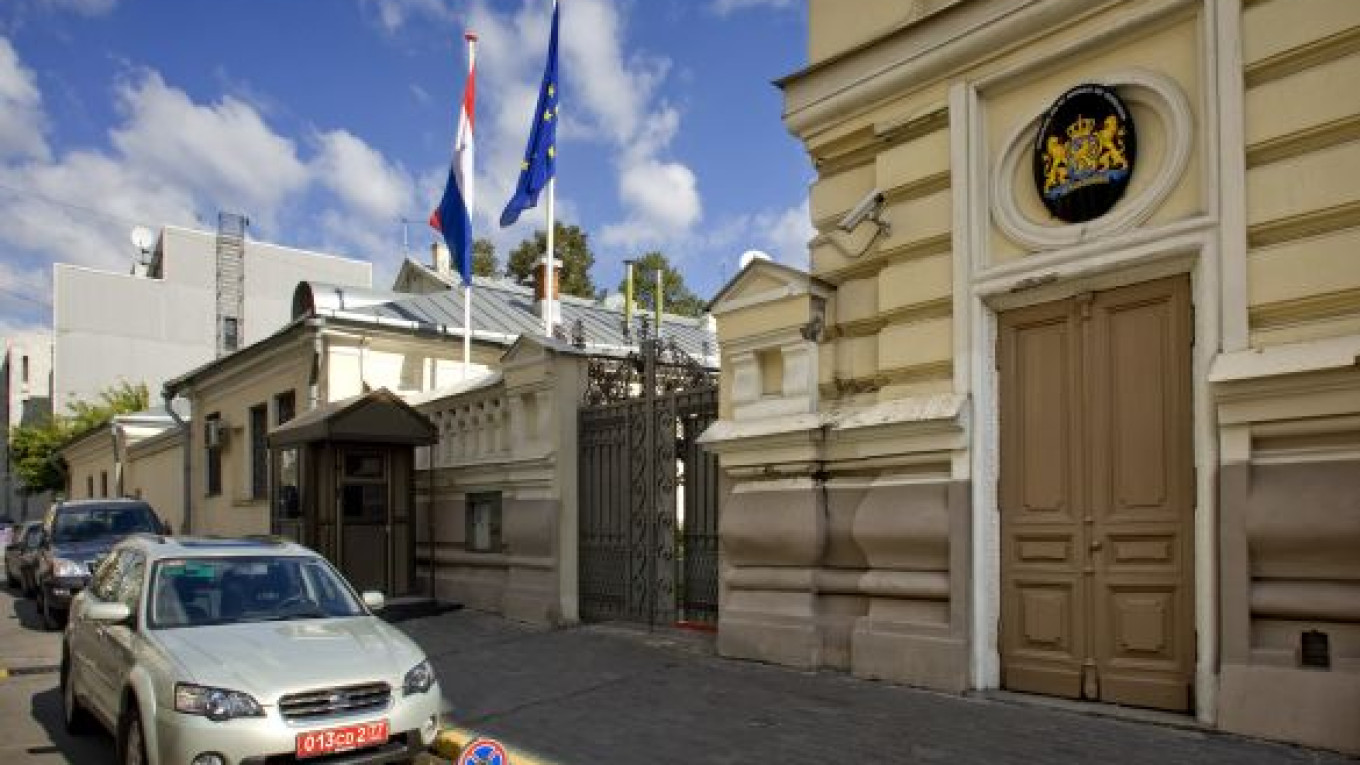Investigators opened a criminal case Wednesday in connection with an attack on a Dutch diplomat in his Moscow apartment, amid growing tensions between Russia and the Netherlands during a year meant to celebrate relations between the two countries.
The Dutch Foreign Ministry condemned the attack on Onno Elderenbosch, the number two diplomat at the Dutch embassy in Moscow, and summoned the Russian ambassador to the Netherlands to answer questions about the incident.
Elderenbosch was returning home Tuesday when he saw that the elevator in his building was out of order, Life News reported, citing an unidentified law enforcement official. After walking up to his fourth-floor apartment, he spotted two men dressed as electricians who were working on a fuse box.
The men told him that the electricity seemed to be out in the whole building and said that they wanted to check if lights were on in his apartment. Once the diplomat opened the door, the men pushed him inside and proceeded to beat him, ransack the apartment, and draw a heart symbol pierced with an arrow and the letters "LGBT" in lipstick on a mirror in the hallway.
Elderenbosch was minorly injured in the attack, Dutch Foreign Minister Frans Timmermans said.
"Our people must be able to work there safely and I want the assurance that the Russian authorities also take their responsibility on that point," Timmermans wrote on his Facebook page Tuesday.
Coming a little more than a week after the detention and reported beating of a Russian diplomat in The Hague, Tuesday's incident will likely serve to increase diplomatic tensions between the two countries, even as they celebrate 400 years of relations in 2013 with joint cultural projects and bilateral visits. Next month, King of the Netherlands Willem-Alexander is set to come to Russia for festivities marking the end of the initiative.
A range of Dutch politicians said they thought that the visit by Willem-Alexander should be cancelled and the bilateral year cut off immediately in light of the attack. But Dutch Prime Minister Mark Rutte said the circumstances behind the incident should be established first before deciding whether to take such steps.
The Russian Foreign Ministry said in a statement Wednesday that it expressed regret over the “deplorable” attack and that Russian law enforcement was doing everything necessary to detain the guilty parties. It also said Moscow was prepared to cooperate with The Hague in investigating the incident.
A criminal case was opened by the Investigative Committee in connection with the attack on charges of breaking and entering, which carry a maximum sentence of two years in prison.
The reference to the LGBT community by the assailants underscored one of the points of tension between the two countries. Activists and politicians in the Netherlands, where gay rights have long been enshrined by law, have slammed Russia for its anti-gay policies, including legislation passed earlier this year banning “propaganda of nontraditional sexual relations” to minors.
Russian gay rights leader Nikolai Alexeyev said he thought the attack was partly intended to send a message that Russia would not stand for the kind of tolerance seen in the Netherlands.
“It [the attack] was deriding the Netherlands and their liberal treatment of sexual minorities,” Alexeyev told Interfax. “I think they [the assailants] did what they did to emphasize that such things are inadmissible in Russia.”
Support for the Dutch side came in from Moscow's diplomatic community as well. U.S. Ambassador to Russia Michael McFaul, a frequent victim of harassment by Kremlin-friendly media outlets and youth groups at the beginning of his stint in Moscow last year, criticized the incident on Twitter.
“We condemn the attack on the minister-counselor of the Netherlands in Moscow. Such actions are unacceptable,” McFaul wrote.
Contact the author at newsreporter@imedia.ru and e.pfeifer@imedia.ru
A Message from The Moscow Times:
Dear readers,
We are facing unprecedented challenges. Russia's Prosecutor General's Office has designated The Moscow Times as an "undesirable" organization, criminalizing our work and putting our staff at risk of prosecution. This follows our earlier unjust labeling as a "foreign agent."
These actions are direct attempts to silence independent journalism in Russia. The authorities claim our work "discredits the decisions of the Russian leadership." We see things differently: we strive to provide accurate, unbiased reporting on Russia.
We, the journalists of The Moscow Times, refuse to be silenced. But to continue our work, we need your help.
Your support, no matter how small, makes a world of difference. If you can, please support us monthly starting from just $2. It's quick to set up, and every contribution makes a significant impact.
By supporting The Moscow Times, you're defending open, independent journalism in the face of repression. Thank you for standing with us.
Remind me later.


